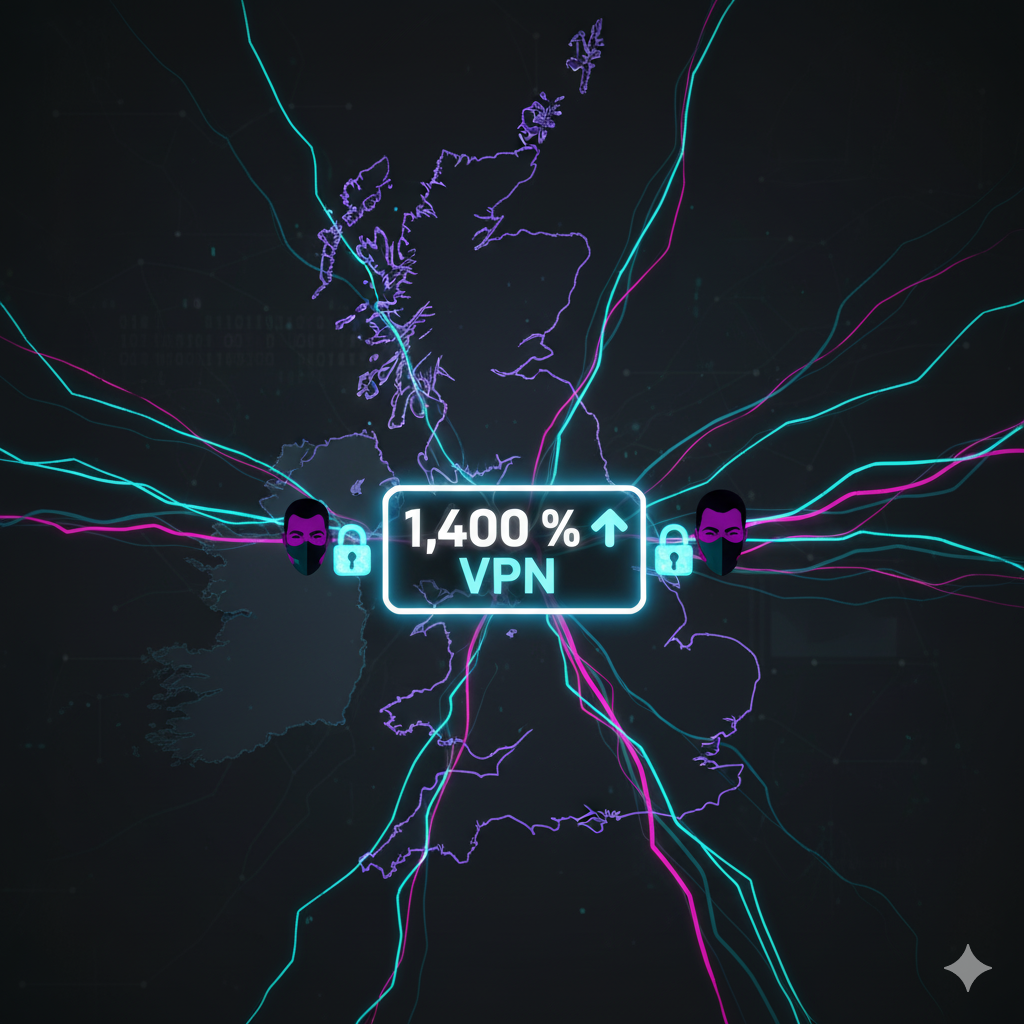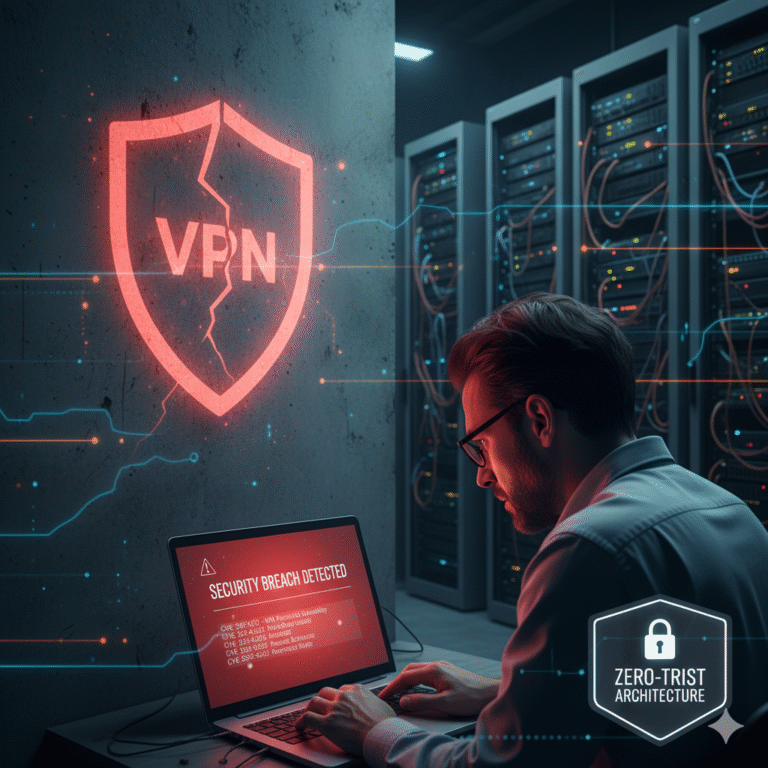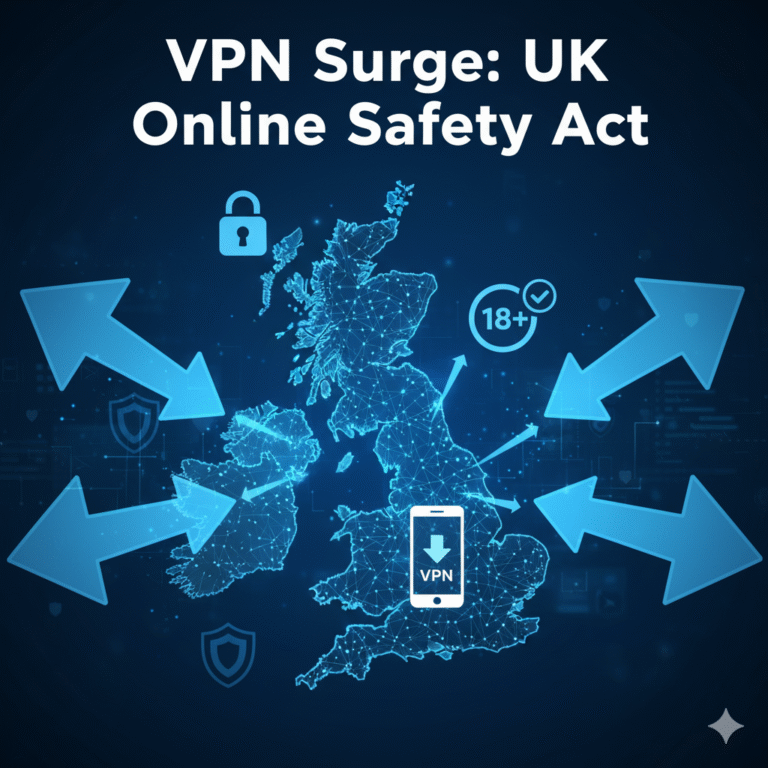On July 25, 2025, the United Kingdom’s Online Safety Act began enforcing mandatory age verification on adult content platforms and other sites deemed “harmful.” Within hours, VPN services saw an unprecedented surge in demand across the UK(UK Age-Verification Law) Providers like Proton VPN reported 1,400% increases in UK signups, with NordVPN, Windscribe, and others noting similarly sharp spikes.
This article explores what’s driving this VPN surge, what it means for privacy and regulation, and how both users and service providers are responding.
What the Online Safety Act requires
The Online Safety Act 2023 mandates that platforms hosting adult content, self-harm material, or eating-disorder content implement “highly effective” age checks for visitors from the UK. These checks may include:
Uploading ID or government-issued documentation
Selfies for facial verification
Use of digital identity wallets
Linking credit card or banking verification
Sites that fail to comply risk fines up to £18 million or 10% of global turnover.
Shortly after the law took effect, the UK saw 5 million extra age verification checks per day on pornography sites, according to the Age Verification Providers Association (AVPA).
The Surge: VPN Signups and Usage Trends
The stats
Proton VPN observed a 1,400% hourly increase in UK signups once the law went live.
The growth was described by Proton as “sustained” across following days.
NordVPN reported a 1,000% increase in UK purchases immediately after.
On iOS in the UK, VPN apps surged into the top 10 free apps, with average daily download increases of ~100%.
Searches for “VPN” spiked across Google Trends in the UK shortly after the law’s activation.
Why the spike matters
For many users, a VPN offers a familiar workaround: masking or altering perceived geographic location, thereby potentially circumventing national age gates. While a VPN is not guaranteed to defeat identity-based checks, for sites relying on IP or geo-blocking heuristics, it offers a tactical shortcut.
But this response has deeper implications: governments seeking to regulate content access may find themselves racing against a public adept at using circumvention tools — creating a feedback loop between regulation and privacy tools.
Privacy, Policy, and Digital Rights Tensions
Privacy vs enforcement
Enforcing age checks often means collecting sensitive data (ID documents, biometrics). Critics argue that pushing users to use VPNs to avoid this is a sign that regulation may be overreaching into personal privacy.
As Daniel Kahn Gillmor from the ACLU noted:
“Those technological fixes have consequences.”
Platform compliance and backlash
In the days following enforcement, over 6,600 pornographic websites reportedly introduced age checks. Social media and content platforms like X, Reddit, and Bluesky are also implementing tighter age gating.
However, digital rights advocates warn that if bypassing is easy, enforcement loses credibility — and the law may prompt more invasive or surveillance-oriented controls down the line.
Regulatory struggles
Ofcom has publicly discouraged the use of VPNs to evade age checks and indicated it will monitor compliance and investigate violations. But practicality is tough: applying restrictions to encryption tools at the ISP or platform level risks infringing on broader digital freedoms (e.g. VPNs for business, privacy, secure access).
What Users and VPN Providers Are Doing
For users
Those wanting privacy or to bypass age checks are flocking to VPNs with UK- or non-UK exit nodes.
Some are exploring hybrid methods: using VPNs together with more anonymous identity wallets rather than full ID.
Others are combining device-level protections, DNS filtering, or router rules to restrict child access more granularly.
For VPN providers
Many VPN services are highlighting UK server options, emphasizing zero-logging, and surfacing guidance on safe usage post-law.
Some providers are cautioning users about using weaker “free VPNs” which may lack strong security or transparency.
VPN firms are also careful in messaging: promoting privacy and resilience without explicitly encouraging illegal or policy circumvention.
Risks & Limitations of VPNs in This Context
A VPN does not automatically defeat ID-based verification (e.g., facial recognition, document upload).
Some platforms may block known VPN IP ranges or require “clean” residential IPs.
Use of VPNs for age gate circumvention might draw regulatory scrutiny or even punitive responses if laws are strengthened.
Users who use low-quality VPNs risk data logging, DNS leaks, or third-party tracking.
Learn more than Free VPN Apps Found with Major Security Flaws
Conclusion
The UK’s enforcement of age verification under the Online Safety Act has catalyzed one of the largest short-term surges in VPN usage ever recorded. The 1,400% spike in Proton VPN signups and the dramatic climb of VPN apps in UK app stores reflect public resistance to enforced identity checks and a broader interplay between regulation and technological autonomy.
While VPNs serve as a tactical tool to bypass geo or IP-based age gating, they are not a complete solution. They also spotlight broader questions: how much data should platforms require to enforce laws? Where do we draw the line between youth protection and chilling privacy? As governments adopt stricter digital rules, users and providers alike will need to navigate a shifting balance between security, access, and civil liberties.



